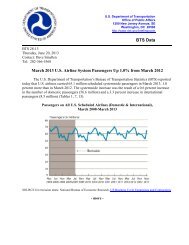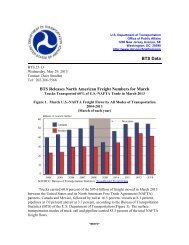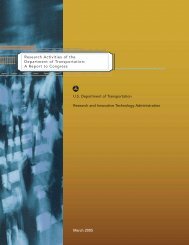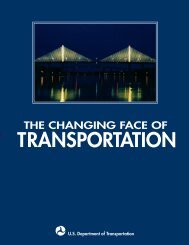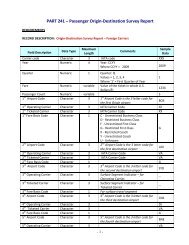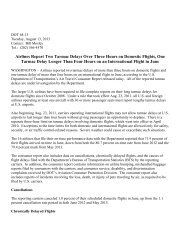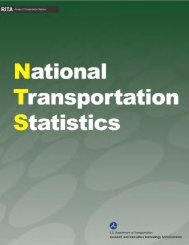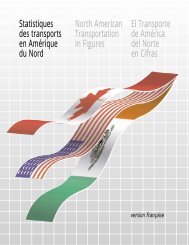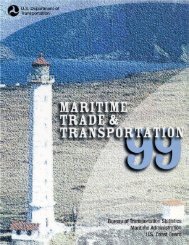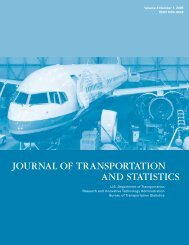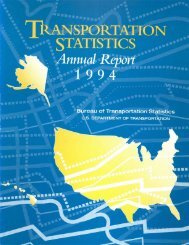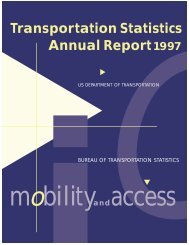table of contents - Research and Innovative Technology ...
table of contents - Research and Innovative Technology ...
table of contents - Research and Innovative Technology ...
Create successful ePaper yourself
Turn your PDF publications into a flip-book with our unique Google optimized e-Paper software.
Appendix B: Conference on the Full Social Costs <strong>and</strong> Benefits <strong>of</strong> Transportation � 253<br />
energy security as external costs. It was noted<br />
that free parking provided by employers <strong>and</strong><br />
retail stores was a case <strong>of</strong> product bundling<br />
rather than external costs. (Lan <strong>and</strong> Kanafani<br />
1993) For example, if one goes to a shopping<br />
mall to buy a shirt, the cost <strong>of</strong> the free parking<br />
provided is paid for in the price <strong>of</strong> the shirt.<br />
Because all shoppers pay the same price for the<br />
shirt, regardless <strong>of</strong> their use <strong>of</strong> parking, one can<br />
argue that shoppers who do not use parking subsidize<br />
those who do. In this example, the issue is<br />
whether it is more appropriate to view free parking<br />
as an external cost, or as a form <strong>of</strong> price discrimination<br />
by a shopping mall that provides a<br />
bundled benefit that is valued by some customers<br />
but not others. Whether or not this form<br />
<strong>of</strong> price discrimination seriously affects economic<br />
efficiency depends on how much it distorts<br />
transportation decisions <strong>and</strong> on the<br />
consequences <strong>of</strong> those distortions.<br />
The view that transportation accident costs<br />
are externalities was also questioned at the conference.<br />
For example, drivers assume a safety<br />
risk <strong>and</strong> impose a safety risk on others (both personal<br />
<strong>and</strong> property damage apply). If motorists<br />
systematically underestimate the risks to themselves,<br />
then the failure would appear to be<br />
caused by imperfect information or possibly<br />
irrational behavior, rather than a case <strong>of</strong> external<br />
cost. The risk to others may be reflected in the<br />
cost <strong>of</strong> liability insurance <strong>and</strong> by the potential to<br />
be held legally liable for damages to others.<br />
There is some evidence to suggest that insurance<br />
<strong>and</strong> legal actions do not fully compensate for<br />
damages caused by motor vehicle accidents.<br />
Estimates <strong>of</strong> the total costs <strong>of</strong> motor vehicle<br />
accidents were presented at the conference. One<br />
estimate indicated that from one-quarter to onethird<br />
<strong>of</strong> the total costs <strong>of</strong> motor vehicle accidents<br />
were borne by society as a whole <strong>and</strong> not by<br />
those involved in the accidents. This suggests<br />
that costs imposed on others by transportation<br />
accidents are very substantial <strong>and</strong> not accounted<br />
for in private individuals’ travel decisions.<br />
Tangible <strong>and</strong> intangible losses to surviving family<br />
members are large components <strong>of</strong> this estimate.<br />
Whether such costs should be classified as<br />
externalities has been the subject <strong>of</strong> debate.<br />
More than one-quarter <strong>of</strong> all drivers in fatal<br />
highway crashes have at least some alcohol in<br />
their systems. Although drunk drivers impose<br />
enormous costs on others, it is not clear that this<br />
problem is best viewed as a case <strong>of</strong> external<br />
costs. Some argued that drunk driving is an<br />
inherently irrational behavior <strong>and</strong> may therefore<br />
fall outside the realm <strong>of</strong> welfare economics.<br />
The cost <strong>of</strong> oil dependence has been classified<br />
as an external cost <strong>of</strong> transportation in several<br />
studies. It may be more appropriately<br />
regarded, however, as a different kind <strong>of</strong> economic<br />
problem. Recent studies have adopted<br />
sometimes internally inconsistent perspectives<br />
on the cost <strong>of</strong> oil dependence. Some have<br />
included military <strong>and</strong> strategic petroleum<br />
reserve costs in their analyses. Others view the<br />
problem primarily as an exercise <strong>of</strong> monopoly<br />
power by the Organization <strong>of</strong> Petroleum Exporting<br />
Countries (OPEC), resulting in price<br />
shocks <strong>and</strong> generally higher oil prices to the<br />
United States. From this perspective, the problem<br />
is not so much that the consumption <strong>of</strong> an<br />
additional barrel <strong>of</strong> oil increases OPEC’s market<br />
power (though part <strong>of</strong> the problem can be viewed<br />
this way), but rather that OPEC has partial<br />
monopoly power in world oil markets in the first<br />
place. Using this interpretation, the source <strong>of</strong><br />
economic inefficiency is the lack <strong>of</strong> full competitiveness<br />
in world oil supply <strong>and</strong> not an externality<br />
associated with the consumption <strong>of</strong> oil.<br />
External costs like environmental pollution<br />
are a significant source <strong>of</strong> inefficiencies in<br />
transportation markets, but not the only source.<br />
Imperfect competition, inadequate or inaccurate<br />
information or perceptions, <strong>and</strong> irrational<br />
behavior all appear to be significant sources <strong>of</strong><br />
economic inefficiency. In the case <strong>of</strong> free parking,<br />
the fact that a service for transportation<br />
users is partially paid for by others may or may



